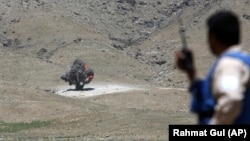April 4 marks the release date of the State Department’s 22nd To Walk the Earth In Safety report, issued by the Office of Weapons Removal and Abatement in the Bureau of Political-Military Affairs. Its goal is to highlight the United States’ accomplishments in conventional weapons destruction.
This is crucial work, because even decades after a conflict had ended, explosive remnants of war pose a deadly hazard to people during daily activities. At the same time, improperly secured small arms, light weapons, and munitions, may easily end up in the hands of the lawless, resulting in criminality that can destabilize an entire region and hinder recovery.
So for example, “We're preventing unplanned ammunition explosions at ammunition depots where things may not be properly stored, and so then they're at risk of exploding,” said Karen Chandler, Acting Deputy Assistant Secretary for Programs and Operations in the State Department’s Bureau of Political-Military Affairs.
“In terms of the landmines and explosive ordnance removal, that is a top priority because we are saving innocent lives. The casualties when we started the program in the 1990s were around 20,000 casualties per year. That number has gone down to approximately 5000 casualties per year,” she said. “And finally, in areas where conflict has just concluded, it allows people to safely return to their homes.”
Last year, said Ms. Chandler, “We've cleared more than 243 million square meters of land.” This year, the largest program is in Ukraine, she said.
“We were able to fund Ukraine clearance operations at about 90 million dollars this year,” she said. “We also have a 45 million dollar a year program in Laos that we fund. And we spend about 40 million dollars in Iraq. And our next largest one is the 24 million dollars we spend in Colombia ... and then finally, in Vietnam, we spend about 20 million dollars a year as well.”
“We're really spreading our work worldwide and hitting some of the hardest hit areas that we need to,” said Ms. Chandler. “It's a program that we really feel has tangible benefits in terms of preventing children's and innocent people's deaths, but also increasing prosperity and economic opportunity in the areas where we have … provided clearance operations. We're able to see farmers returning to clear [and] farm their land. In terms of critical infrastructure, we’re allowing utilities to function again.”
“It's really protecting civilian populations from harm.”






